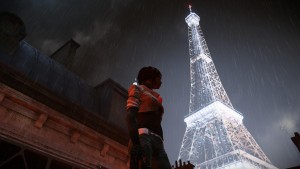 If George Orwell did not write the 1984, then a lot of other artworks would not exist today. Bradbury: Fahrenheit; Lem: Eden; Terry Gilliam: Brazil; David Bowie; Eurythmics – and the list is not exhaustive. Oh, and of course, there is the video game titled Remember Me.
If George Orwell did not write the 1984, then a lot of other artworks would not exist today. Bradbury: Fahrenheit; Lem: Eden; Terry Gilliam: Brazil; David Bowie; Eurythmics – and the list is not exhaustive. Oh, and of course, there is the video game titled Remember Me.
Jean-Maxime Moris, creative director of the game said in an interview that originally they wanted to work on the topic of global warming with a story placed in a seaside city, but in the end (he did not say this, but he should) they renewed the cyberpunk genre. Cyberpunk was based on the technological development seen from the 1980s, and Dontnod Entertainment made it fitting for the 2010s.
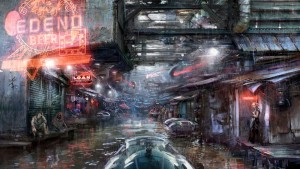 The style elements are very clean-cut. Neo-Paris could be Night City with its giant holo-ads, surveillance camera drones, cyberpolice and vertically differentiated social classes. This is the city you get to know in a linear story, and I must admit it enthralled me. I was fascinated not just by the orgy of visuals and the perfectly built cyberpunk environment, but everything else that strengthens these. You continuously get information about this brand new world in which guns are banned, mammoth corporations and “freely” elected dictators rule, the middle class vanished, and memories worth more than gold.
The style elements are very clean-cut. Neo-Paris could be Night City with its giant holo-ads, surveillance camera drones, cyberpolice and vertically differentiated social classes. This is the city you get to know in a linear story, and I must admit it enthralled me. I was fascinated not just by the orgy of visuals and the perfectly built cyberpunk environment, but everything else that strengthens these. You continuously get information about this brand new world in which guns are banned, mammoth corporations and “freely” elected dictators rule, the middle class vanished, and memories worth more than gold.
The main elements of every action-adventure game are atmosphere, game mechanism and combat. I would not write more about the world setting, because I would only go into raptures over it, because the atmosphere, let’s say, carries the whole game on its back. Of course, the visuals are greatly supported by the eerie music of Olivier Deliviére, and I felt that every design element is on its proper place.
 Bad criticism the game received was mostly about the mechanism. It got lots of cold; in a linear story you travel between battle scenes by unmissable platform jumps, and combat almost always means fighting against more than one enemies. But I ask: Really? Are these the biggest problems? How much games do have the same mechanism? OK, you need no dexterity for climbing walls, and that means you get help in continuing the story. Platforming is simply not important here; in my opinion, it is much more nerve-racking when hard jumps block the story and expand playtime beyond reason. I hate the feeling when I play hours to get over one or two percents of the story.
Bad criticism the game received was mostly about the mechanism. It got lots of cold; in a linear story you travel between battle scenes by unmissable platform jumps, and combat almost always means fighting against more than one enemies. But I ask: Really? Are these the biggest problems? How much games do have the same mechanism? OK, you need no dexterity for climbing walls, and that means you get help in continuing the story. Platforming is simply not important here; in my opinion, it is much more nerve-racking when hard jumps block the story and expand playtime beyond reason. I hate the feeling when I play hours to get over one or two percents of the story.
But I show you another aspect: It is silently accepted that action, tactics and other genres incorporate RPG-elements, what’s more, games are called RPGs because of these sparsely used elements, even if they belong to other genres. (For example, Mass Effect 2 is a tactical adventure, and Diablo is hack’n’slash. They are not RPGs.) So, if this is accepted, then what’s wrong with platformer elements in a story- and atmosphere-centered game? I do not expect gamers to interpret everything on its place, but critics have a heavy influence on gamers, so they should think about their opinion a bit more. (I was even reading articles that show no leg-work, but I will not be personal.)
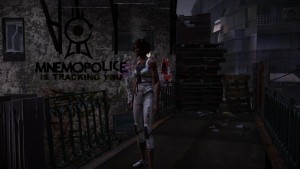 For example, I did not find a review about Remember Me drawing a parallel with Orwell’s 1984. On the one hand, I don’t think that I am the only one who discovered a reflection on Thought Police in Remember Me’s world, and on the other hand, Moris himself confirmed in an interview that they used 1984 as a source. On the third hand (if you have one), Remember Me’s story begins in 2084, and that is not a correspondence by chance, so it should be picked up on. Well, let’s carry on with the combat system.
For example, I did not find a review about Remember Me drawing a parallel with Orwell’s 1984. On the one hand, I don’t think that I am the only one who discovered a reflection on Thought Police in Remember Me’s world, and on the other hand, Moris himself confirmed in an interview that they used 1984 as a source. On the third hand (if you have one), Remember Me’s story begins in 2084, and that is not a correspondence by chance, so it should be picked up on. Well, let’s carry on with the combat system.
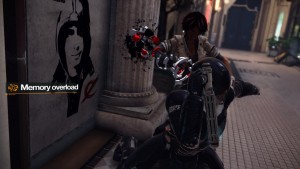 Fighting needs a sense of rhythm, as if you make the character dance. Firearms are banned, so there is only close combat, but it is supported by the main stream of technological advancement, a spinal implant that practically rewires the human body on neural level. You do not just sense the incoming attacks, but form and reform your own combination of moves in a fragment of a second, as you like. You are experimenting with the combos, and can never rest, even if you already found your favorite kicks and hits, because sometimes they need to be changed and fine tuned in the middle of a fight. Maybe, you have just two buttons to button, but there are various kicks and blows regarding strength and effect, so you can do the maths about four movement combinations in different lengths. I didn’t count it. It is a lot.
Fighting needs a sense of rhythm, as if you make the character dance. Firearms are banned, so there is only close combat, but it is supported by the main stream of technological advancement, a spinal implant that practically rewires the human body on neural level. You do not just sense the incoming attacks, but form and reform your own combination of moves in a fragment of a second, as you like. You are experimenting with the combos, and can never rest, even if you already found your favorite kicks and hits, because sometimes they need to be changed and fine tuned in the middle of a fight. Maybe, you have just two buttons to button, but there are various kicks and blows regarding strength and effect, so you can do the maths about four movement combinations in different lengths. I didn’t count it. It is a lot.
 The last thing is the Sensen (Sensation Engine), that defines everything in the world of Remember Me, so it also summarizes everything I wrote above. This is the spinal implant that helps you in combat, and it ruined the whole society. Literally. Sensen lead people toward an advanced virtual community life, because they became able to literally share their experiences and memories with each other. I won’t go into details; all in all, it was a natural process that the government became able to monitor the activity of everyone from the “inside” (what was that about Thought Police?), and of course, the more interesting experiences and memories became expensive. Very expensive. Sometimes lifetakingly expensive.
The last thing is the Sensen (Sensation Engine), that defines everything in the world of Remember Me, so it also summarizes everything I wrote above. This is the spinal implant that helps you in combat, and it ruined the whole society. Literally. Sensen lead people toward an advanced virtual community life, because they became able to literally share their experiences and memories with each other. I won’t go into details; all in all, it was a natural process that the government became able to monitor the activity of everyone from the “inside” (what was that about Thought Police?), and of course, the more interesting experiences and memories became expensive. Very expensive. Sometimes lifetakingly expensive.
The Remember Me shows the end of these processes. People agonizing on the bottom of the society sold so much of their remembrances that they became brain-washed zombies. Everyone in the upper classes use those remembrances as narcotics (eh, how it was in that movie from 1995, Strange Days?), and the really wealthy can literally rewrite their life by not-just-legally-bought memories. And if I mentioned the black market of memories, I have to tell you about the memory hunters too.
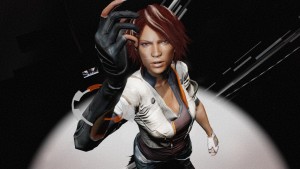 Our main hero, Nilin is a memory hunter, furthermore, one of the bests. She is not just able to extract memories from others with the Sensen implant (and almost everyone has it), but can change them, and that leads to a change in personality as well. The player has the opportunity to make allies from enemies, and this is the main tool to get to know the story of the memory-deprived main character. And that is also the story of the game, of course, so at the end there are some twists about “What happened in real?”
Our main hero, Nilin is a memory hunter, furthermore, one of the bests. She is not just able to extract memories from others with the Sensen implant (and almost everyone has it), but can change them, and that leads to a change in personality as well. The player has the opportunity to make allies from enemies, and this is the main tool to get to know the story of the memory-deprived main character. And that is also the story of the game, of course, so at the end there are some twists about “What happened in real?”
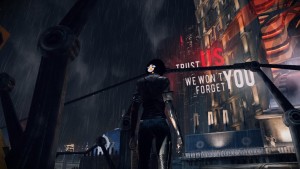 In the long run, the game works with not less of a topic than the philosophical questions about where this sharing of our thoughts and life experiences go? And this is a hard question which also makes the only weak point of the game; there should be more memory rewrite in it, or the developers should give more opportunities of using this feature, because it is the main ability of Nilin, and on the other hand, it is the most interesting element of the game mechanism.
In the long run, the game works with not less of a topic than the philosophical questions about where this sharing of our thoughts and life experiences go? And this is a hard question which also makes the only weak point of the game; there should be more memory rewrite in it, or the developers should give more opportunities of using this feature, because it is the main ability of Nilin, and on the other hand, it is the most interesting element of the game mechanism.
The not enough memory rewrite caused a feeling of lack, so I cannot give a honest five points to the game. In spite of this the idea and realization of memory rewrite, the world setting, the unfailing atmosphere and greatly variable combat system deserve a high score.
—Garcius—
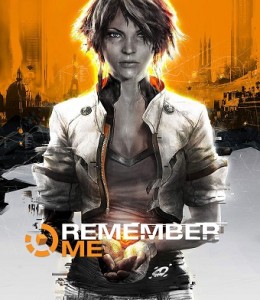 Title: Remember Me
Title: Remember Me
Publisher: Capcom
Developer: Dontnod Entertainment
Homepage: http://www.remembermegame.com
Style: action, adventure, story
What I liked:
everything
What I didn’t like:
not enough memory rewrite


No comments
Trackbacks/Pingbacks